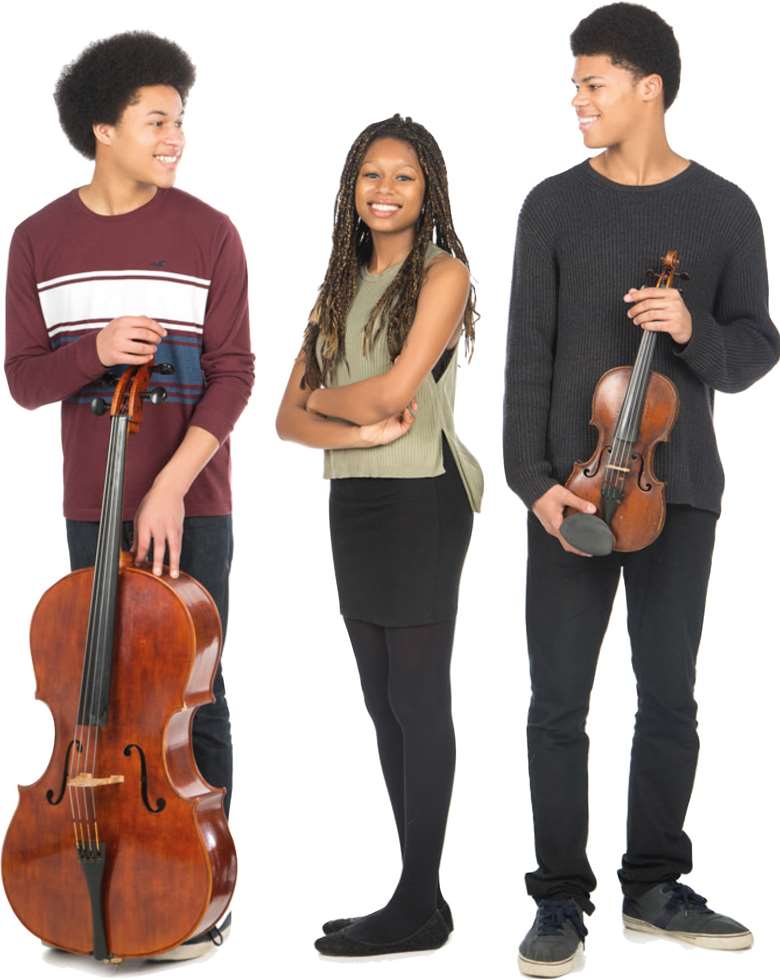Strength in numbers: Kanneh-Masons
Isata Kanneh-Mason
Thursday, November 1, 2018
A collaborative outlook is vital in chamber music – both on and off the stage. Isata Kanneh-Mason, pianist with the eponymous trio, shares how mentorship has changed how she and her brothers work together.

Sheku, Braimah and I have been playing together as a trio for about ten years now, and we have explored and performed many works together. Until recently, we would generally learn and perform repertoire completely on our own without any extra coaching. Although we did have the occasional lesson, it wasn't until we were lucky enough to be a part of the Highgate International Chamber Music Festival's Mentorship Scheme that we experienced what it was like to have consistent help. The scheme lasted for about a year, and it was during that time that we, as a trio, experienced significant improvement.
All three of us feel that this advice was invaluable – we now believe that frequent coaching is very important. Of course one can improve on one's own, but it is often very difficult to give the correct advice when you are also concentrating on playing. Self-awareness can reach a certain level, and then there are things that can only be discovered by someone else.
We think this is true for a musician of any age, but perhaps even more so for young musicians. I remember when our trio first played to Ashok Klouda, co-founder of Highgate International Chamber Music Festival. He was our main mentor throughout the scheme, and for our first session together, we played the first movement of Beethoven's Op. 1 No 3. We had been performing this as a trio for some time, and so we didn't feel we had much left to say about it, and would probably cover it in one session. Three hours later we had barely worked through the first movement, and left the session with our minds buzzing with new ideas, and a completely new vision of the movement in our heads. Our next rehearsal alone was significantly more detailed.

Pianist Isata Kanneh-Mason © STUART MCINTYRE
As a young musician, it can sometimes feel like you have ‘perfected’ a piece, and it is not until you have had coaching from someone older and/or more musically developed that you realise you have barely scratched the surface. Many things changed for us as a trio once we started having coaching sessions, and not just during the actual lessons, but in our separate rehearsals as well. We began listening with a much more critical and advanced ear, and the level of detail that we would go into during rehearsal was much greater. This also meant that even when the scheme ended and we were no longer having regular coaching, we could still continue to use all the things we learned during that year to improve in a way we could not have before, simply because we had more knowledge of how to do so. This kind of close guidance doesn't just help a musician improve while receiving the teaching; it can set them up for life.
Another huge benefit of having a mentor is that they can highlight your weaknesses. Previously in our trio rehearsals, we would help each other to improve as individuals. What was lacking was our ability to evaluate our trio playing as a whole. However, a mentor was able to tell us exactly what needed to be done to improve our trio playing. We learned how to blend our sounds, how to balance properly, and how to really listen to each other. These things may sound simple and obvious, but they are often the hardest things to do, especially as young musicians.
I also think that having regular coaching is very important for a young musician's motivation and inspiration. The knowledge that you have someone to play to every fortnight gives you an incentive to work hard and prepare something. Without this, it is easy to coast and learn repertoire much more slowly. A mentor can push you to reach your potential, and we certainly felt that throughout the scheme we were being pushed in the best way, not just to work harder and learn repertoire faster, but to play to the best of our ability and to be more critical of ourselves. A mentor can also inspire you in a role-model sense. As a young person, you can learn from being advised on what to do, but an even more inspirational way of learning is when you hear someone play and learn from, and are inspired by, their playing. Being part of the Highgate International Chamber Music Festival Scheme meant that we got to watch some of the festival's concerts. Here, we felt that we were watching chamber music at the highest level; it was aspirational.
I think that this kind of scheme can also benefit the mentors themselves. Since the scheme, our trio has given masterclasses to young chamber groups and we've discovered that you learn a lot from teaching others. It highlights the common difficulties in playing chamber music, and I often find that my advice to others can usually relate to my own playing as well. It is also inspiring to see musicians improving and responding to what you say, and we believe that you can learn something from every performance, no matter the level.
So how does one find a mentor? We were lucky enough to be approached by the Highgate Festival but it is not always that easy. It is hard to know which kind of musician would be the perfect fit for your group and a lot of the time it can be trial and error. However, one of the best ways is to go to lots of concerts and see whose playing you really enjoy. Chamber music courses are also a fantastic thing to be a part of, as you will have masterclasses with many musicians, and can always stay in touch after the course to request more lessons if you enjoyed their teaching. The mentoring experience has been invaluable for our trio, and for us as individual musicians as well.

